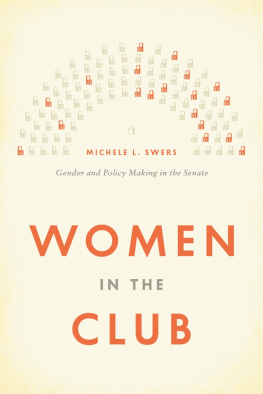Michele L. Swers is associate professor of American government at Georgetown University. She is the author of The Difference Women Make, also published by the University of Chicago Press.
The University of Chicago Press, Chicago 60637
The University of Chicago Press, Ltd., London
2013 by The University of Chicago
All rights reserved. Published 2013.
Printed in the United States of America
22 21 20 19 18 17 16 15 14 13 1 2 3 4 5
ISBN-13: 978-0-226-02279-6 (cloth)
ISBN-13: 978-0-226-02282-6 (paper)
ISBN-13: 978-0-226-02296-3 (e-book)
Library of Congress Cataloging-in-Publication Data
Swers, Michele L., author.
Women in the club : gender and policy making in the Senate / Michele L. Swers.
pages cm
Includes bibliographical references and index.
ISBN 978-0-226-02279-6 (cloth : alkaline paper) ISBN 978-0-226-02282-6 (paperback : alkaline paper) ISBN 978-0-226-02296-3 (e-book)
1. Women legislatorsUnited States. 2. WomenPolitical activityUnited States. 3. United States. Congress. Senate. 4. United StatesPolitics and government. I. Title.
JK1161.S94 2013
328.73071082dc23
2012036977

This paper meets the requirements of ANSI/NISO Z39.48-1992 (Permanence of Paper).
Acknowledgments
I have spent much of my career following the slow progress of women into political office in the United States. I wanted to understand whether electing women influences policy outcomes and what it means to say women bring a distinctive perspective to policy making. My first effort to examine these questions involved a comprehensive study of gender differences in legislating on womens issues in the House of Representatives. The Difference Women Make: The Policy Impact of Women in Congress (2002) showed that women are more active advocates for policies related to women, children, and families in comparison with male colleagues. However, the study also showed that gender interacts in complex ways with partisanship, ideology, institutional norms, and the electoral context.
The desire to further explore these questions of when gender matters and when it does not and how legislators utilize gender strategically to advance their policy and political goals led me to write a book on gender and the Senate. Senators have more individual power than House members do, and they can reach into more policy areas, which allowed me to broaden my focus to policy arenas outside of womens issues, including defense policy and judicial nominations. The storied history of the Senate as a club with strong institutional norms could provide fresh perspective on the integration of women into legislative bodies. The polarization of contemporary politics and the high-profile role played by senators as party messengers invited further study of the interaction of party and gender.
Throughout this project I have benefited from the generous support of many. I thank Georgetown University and the Department of Government for research support through grants and a sabbatical. I am very grateful to all of my wonderful and dedicated research assistants over the duration of this project, including Christine Kim, Holly Boux, Shauna Shames, Carin Robinson, Meg Massey, and Bryce Myers. I particularly thank Christine Kim, who collaborated with me on articles on judicial nominations. Some of the research on Supreme Court nominations also appears in Replacing Sandra Day OConnor: Gender and the Politics of Supreme Court Nominations, in the Journal of Women, Politics, and Policy. Some of the data and theory on defense policy also appear in Policy Leadership Beyond Womens Issues, in Legislative Women: Getting Elected, Getting Ahead.
Many friends and colleagues have shared valuable insights and expertise as I tried to master new policy literatures on defense policy and judicial nominations. Liz Stanley and Pat Towell gave me crash courses in military force structure and the geographic distribution of important bases and defense contracts. My dad, Theodore Probst, a retired captain in the naval reserve, kept me updated on military personnel and retiree concerns by sending me the legislative updates from the Association of the U.S. Navy. Amy Steigerwalt, Nancy Scherer, Lauren Cohen, Sarah Binder, Steve Rutkus, and Kevin Scott shared their knowledge and data on the judicial nominations process. Longtime scholars of the Senate offered invaluable advice and guidance, including Larry Evans, Frances Lee, Pat Sellers, and Sarah Binder. I am very grateful to women and politics scholars who inspired me and laid the foundation for my work, including Clyde Wilcox, Karen OConnor, Sue Carroll, Debra Dodson, Cindy Simon Rosenthal, Sue Thomas, Marian Palley, Joyce Gelb, Peggy Conway, and Beth Reingold.
I am particularly indebted to the many anonymous Senate staffers, former senators, and interest group leaders who generously shared their time and insider accounts of how things really work in the Senate. Their insights reshaped my thinking and illuminated the strategic calculations senators make every day about how to achieve their policy goals and secure reelection. I thank Frances Lee, Jennifer Lawless, and anonymous reviewers for reading chapter drafts and offering advice. I am very grateful to my editors John Tryneski and Rodney Powell at the University of Chicago Press for their support and encouragement to bring this project to fruition. I also thank Kailee Kremer, Sharon Brinkman, Melinda Kennedy, and Meg Cox for shepherding my manuscript from copy edits to the final book.
This book could not have been written without the love and support of my family. My parents, Theodore and Belle Probst, and in-laws, Ron and Gwen Swers, set the example of hard work and dedication to family and supported me through college, graduate school, and career. I am especially lucky to be surrounded by the love of my sister and brother-in-law and their families, Arlene, Marvin, Joey, and Aaron Birnbaum; and Jeff, Shana, and Isaac Swers; as well as Ralph and Stuart Herman. We miss Shana and Gwen every day, but their spirits live on through their sons and grandchildren. Finally, I dedicate this book to my husband, Andrew Swers, and children, Alex and Lisa Swers. Alex and Lisa have brought more joy to my life than I could have imagined. My husband Andy is my best friend and greatest champion. He made sure I had the latest technology and read the whole manuscript. Thank you for 1,001 pep talks to keep me going as I worked on this book and for always believing in me.
 This paper meets the requirements of ANSI/NISO Z39.48-1992 (Permanence of Paper).
This paper meets the requirements of ANSI/NISO Z39.48-1992 (Permanence of Paper).









